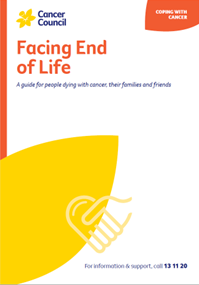In hospital
Even when death is expected, more people approaching the end of life die in hospital than anywhere else. While some people and their families feel more secure being near health professionals, others feel anxious about hospital care, believing it will be too impersonal.
Learn more about:
Overview
If you have spent a lot of time in hospital during your illness, you may want to stay on the same ward where you are familiar with staff and surroundings, they know you and they understand your specific needs. You’ll need to check if this is possible – sometimes people are moved to a different ward as their medical needs change.
To help create a more homely environment, ask if you, your carers, family or friends can bring in familiar items from home, such as a favourite blanket or photos.
Ensuring your wishes are respected
Decisions about your care may be made without your input. Hospitals sometimes provide medical interventions, such as resuscitation and intravenous drips, that may not be what you want in the final weeks or days of life. Your health care team should work with you to make sure your care plan matches your preferences. If you are concerned, let the hospital staff know what interventions you are comfortable receiving and what you’re not happy to have happen.
You can arrange to have your preferences and wishes recorded in an advance care directive before an emergency occurs. It is a good idea to also keep a copy at home so your carers and your family and friends know your wishes too.
The different aspects of end-of-life care in a hospital can be managed with communication and advance care planning. Preparing an advance care directive (known by different names depending on where you live) can help give you control over your medical treatment and care. See Advance care planning for further details on what this is and how it can help ensure your wishes are followed.
Key points about a hospital
- Experienced medical and nursing staff are available at short notice to manage your physical symptoms (e.g. pain, breathlessness, fatigue, delirium) and your emotional needs (e.g. anxiety, agitation).
- You must be in a hospital to donate your organs. For details, see Donating organs or visit donatelife.gov.au.
- Carers can leave at the end of the day and go home to get some rest. But some carers may find leaving you to go home difficult.
- It provides 24-hour care.
- Some families prefer not to live in a house where someone has died, although others find this a comfort.
→ READ MORE: In a residential aged care facilities
Podcast: Living with Dying
Listen to more episodes of our podcast for people affected by cancer
More resources
Prof Jane Phillips, Head, School of Nursing and Professor, Centre for Healthcare Transformation, Queensland University of Technology and Emerita Professor Palliative Nursing, University of Technology Sydney, NSW; Prof Meera Agar, Palliative Care Physician, Professor of Palliative Medicine, University of Technology Sydney, IMPACCT, Sydney, NSW; Sandra Anderson, Consumer; A/Prof Megan Best, The University of Notre Dame Australia and The University of Sydney, NSW; Prof Lauren Breen, Psychologist and Discipline Lead, Psychology, Curtin University, WA; David Dawes, Manager, Spiritual Care Department, Peter MacCallum Cancer Centre, VIC; Rob Ferguson, Consumer; Gabrielle Gawne-Kelnar, Counsellor, Psychotherapist and Social Worker, One Life Counselling & Psychotherapy, NSW; Justine Hatton, Senior Social Worker, Southern Adelaide Palliative Services, Flinders Medical Centre, SA; Caitlin MacDonagh, Clinical Nurse Consultant, Palliative Care, Royal North Shore Hospital, Northern Sydney Local Health District, NSW; McCabe Centre for Law and Cancer; Palliative Care Australia; Belinda Reinhold, Acting Lead Palliative Care, Cancer Council QLD; Xanthe Sansome, National Program Director, Advance Care Planning Australia; Kirsty Trebilcock, 13 11 20 Consultant, Cancer Council SA.
View the Cancer Council NSW editorial policy.
View all publications or call 13 11 20 for free printed copies.
Need to talk?
Support services
Coping with cancer?
Speak to a health professional or to someone who has been there, or find a support group or forum
Cancer Council Online Community
A community forum – a safe place to share stories, get tips and connect with people who understand
Cancer information
Advanced cancer
Information for all stages of advanced cancer, from the initial diagnosis to palliative care and grief
Resource hub
Guides, fact sheets, videos, podcasts and more for people with cancer, their families and friends

